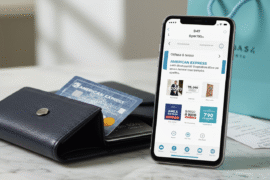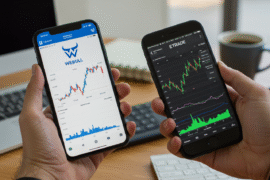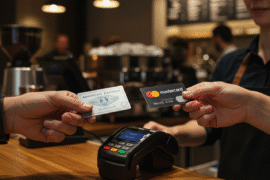This article may contain references to products or services from one or more of our advertisers or partners. We may receive compensation when you click on links to those products or services. Nonetheless, our opinions are our own.

Updated by Albert Fang
The world of cryptocurrency has changed a lot in the last few years. While cryptocurrencies were once considered a tool for illegal activity by many, today, they are widely accepted, and even some governments have ruled them legal tender.
The concept of cryptocurrency debit cards has also evolved, but not as quickly as cryptocurrency itself. Crypto debit cards are still not widely available and tend to be expensive or only available in certain countries, but they seem to have a bright future.
Let’s look at the current state of crypto debit cards so you can decide whether it’s worth getting one for yourself or your business.
- Crypto debit cards are a hot trend.
- Bitcoin debit cards.
- Bitcoin debit cards existed before crypto debit cards.
- How do crypto debit cards work?
- Crypto debit cards are not all created equal.
- Who can get a crypto debit card?
- Can you put just any cryptocurrency on a crypto card?
- Do crypto debit cards charge fees?
- Other card features to consider.
- Banks and blockchain technology.
- The future possibilities
- Recommended Reads
Crypto debit cards are a hot trend.
Crypto debit cards are a hot trend in the crypto space. If you’re new to cryptocurrency, you might wonder how they work, what they can be used for, and whether or not they’re right for you. This article will answer your questions about crypto debit cards and help you decide if one is right for your lifestyle.
Crypto cards are becoming more popular as cryptocurrency becomes more mainstream. There’s no limit on who can get one (almost anyone can), whether or not you keep your private keys secure or share them with the bank holding your funds at any time (more on that later).
And yes: Crypto cards such as those issued by Clubswan, Bitpay, and Coinbase truly allow users to spend their cryptocurrency anywhere that accepts Visa or MasterCard payments—without paying an additional fee!
Bitcoin debit cards.
Like any other debit card, a Bitcoin debit card allows you to spend your cryptocurrency on the go—but in this case, the cryptocurrency is Bitcoin.
So what does that mean? Well, it means several things:
- You can spend your Bitcoins at any store that accepts credit or debit cards.
- You can use it to complete online and offline transactions and purchases wherever major credit cards are accepted (like Amazon).
Bitcoin debit cards existed before crypto debit cards.
Bitcoin debit cards existed before crypto debit cards. The concept of using your cryptocurrency holdings to pay for goods and services has been around since the early years of Bitcoin (BTC).
Bitcoin has since evolved into more than just a digital currency; it’s now used as both an investment vehicle and a way of paying for things online—just like any other fiat currency (USD or EURO).
When it comes time to spend that money, though, BTC still isn’t accepted everywhere, and many consumers don’t want all their assets tied up in one form of value storage. That’s where bitcoin debit cards come into play!
A bitcoin debit card allows you to spend your coins anywhere Mastercard or Visa is accepted—which is everywhere, considering how ubiquitous credit card use is these days.
How do crypto debit cards work?
Crypto debit cards are pretty straightforward. You load your crypto onto the card through a linked wallet and can spend your crypto anywhere that accepts debit cards. It’s just like any other debit card you may have used in the past—but with some cool features!
You can use it at home or abroad, online or in person; you can even use it to pay for gas and groceries! It’s a great way to spend all your cryptocurrencies without converting them into another currency first. You can also use them to liquidate large amounts of crypto.
Crypto debit cards are not all created equal.
There are a lot of different crypto debit cards available, and they all have different features. Some cards don’t charge fees, while others charge high fees that make them less desirable than the competition. Some cards are more widely accepted than others, so it’s important to find one that works for you in terms of usability and acceptance.
Security is another important consideration when choosing a crypto debit card; some offer additional security features like multi-factor authentication or biometric scans to protect against fraudsters.
Finally, customer service plays a role in helping you get started with your new card – some companies provide better customer service than others and can help answer questions about their product or process transactions faster if there’s an issue with your account.
Who can get a crypto debit card?
The first requirement for getting a crypto debit card is being able to verify your identity. You must be able to provide proof that you are who you say you are, and this can include things like an ID card or passport, as well as documents that show your address and employment history.
The second requirement has a bank account to link the card to it. While some firms allow people without bank accounts to get their cards, the vast majority require users to have one before using them. Some, like Clubswan, will give you a bank account as part of the solution.
Finally, most crypto debit cards require users to have good credit scores to apply for the first (and because they don’t want criminals using these cards). If your score isn’t good enough, then there’s no reason why your application should be accepted, either!
Can you put just any cryptocurrency on a crypto card?
Crypto debit cards are an exciting development for the crypto community, but they have some limitations.
The first is that you can only use them to store cryptocurrencies that the card provider accepts. It is important to check the number and types of cryptocurrencies a debit card supports before you apply for it.
Do crypto debit cards charge fees?
Before making a decision, you should know that some crypto debit cards charge monthly and loading fees. For example, some cards charge zero monthly fees while others charge as high as $100.
Other charges, such as loading, conversion, and transaction fees, may also apply.
Other card features to consider.
There’s more to consider when choosing a crypto debit card than the costs. It also pays to consider what type of card you want and whether you need customer support options.
- Card security features
- Reloadable
If you want an all-in-one solution that can be reloaded with cryptocurrency, then a prepaid card might be for you. However, if you prefer greater control over your spending and don’t mind paying some transaction fees to do so, consider a debit card instead.
Hybrid cards offer both options so that users can choose which works best for them on a given day. This flexibility makes them ideal for those who want to use cryptocurrency for regular spending. Still, it may not have enough funds available at any given time due to fluctuating prices or other factors (for example, an unexpected expense).
- Customer support features: Debit cards require more contact with customer service because they can only store fiat currencies. In contrast, most prepaid cards store cryptocurrencies like BTC/ETH/LTC, etc., which means they will require more maintenance (setting up wallets) before being usable by customers after purchase – this may come at additional cost depending on how much help is needed during setup versus how much work someone wants/needs themselves.”
Banks and blockchain technology.
Banks are starting to accept cryptocurrency and use blockchain technology. Cryptocurrency can be used for payments, but it is not a currency. Cryptocurrency is not regulated by the government, making it highly volatile. It means the amount of cryptocurrency you got yesterday might be worth more or less today.
The future possibilities
The future of payments is digital, and don’t let your business be left behind. The cryptocurrency industry is growing rapidly, and it’s important to keep up with this trend.
Bitcoin debit cards existed before crypto debit cards, but now there are many more options on the market for those who prefer to use their cryptocurrencies as fiat currency. These crypto debit cards allow you to spend your cryptocurrency as if it were cash in a traditional bank account.
If you want your business to grow, you need to adapt quickly and make sure that your products and services are relevant to today’s consumers.
So, if you’re looking for a way to get started with crypto payments in your business, a crypto debit card may be the perfect solution. It gives you access to all of the benefits of blockchain technology without having to worry about security risks or complicated integrations. Plus, by using one of these cards, you can be sure that your customers will have an easy time paying with cryptocurrency.

Reviewed and edited by Albert Fang.
See a typo or want to suggest an edit/revision to the content? Use the contact us form to provide feedback.
At FangWallet, we value editorial integrity and open collaboration in curating quality content for readers to enjoy. Much appreciated for the assist.
Did you like our article and find it insightful? We encourage sharing the article link with family and friends to benefit as well - better yet, sharing on social media. Thank you for the support! 🍉
Article Title: The Future is Crypto Debit Cards
https://fangwallet.com/2022/10/12/the-future-is-crypto-debit-cards/The FangWallet Promise
FangWallet is an editorially independent resource - founded on breaking down challenging financial concepts for anyone to understand since 2014. While we adhere to editorial integrity, note that this post may contain references to products from our partners.
The FangWallet promise is always to have your best interest in mind and be transparent and honest about the financial picture.
Become an Insider

Subscribe to get a free daily budget planner printable to help get your money on track!
Make passive money the right way. No spam.
Editorial Disclaimer: The editorial content on this page is not provided by any of the companies mentioned. The opinions expressed here are the author's alone.
The content of this website is for informational purposes only and does not represent investment advice, or an offer or solicitation to buy or sell any security, investment, or product. Investors are encouraged to do their own due diligence, and, if necessary, consult professional advising before making any investment decisions. Investing involves a high degree of risk, and financial losses may occur including the potential loss of principal.
Source Citation References:
+ Inspo











































